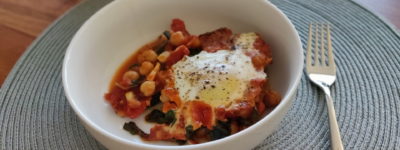
Baked Eggs with Chickpeas & Spinach
Eggs baked in a tomato sauce with chickpeas and spinach
In Germany, most pickles are made with some sugar, similar to “bread and butter” pickles in the US. Finding proper dill pickles can sometimes be a challenge. We frequently have to find them in the Polish or Russian section of the market, if there is one.
When cucumbers are in season, we make them ourselves. I have a fermentation crock for making fermented dill pickles, but that requires about a month to make. So, I have put together this recipe for making quick dill pickles.
This recipe will make ~1 liter/quart of pickles, depending on if you use whole or sliced pickles.
250ml white vinegar
35g salt
2 tbsp. coriander seeds
1 tsp. mustard seeds
6 cloves garlic, minced or sliced
1/4 tsp. chili flakes
2 tsp. dried dill OR 6-10 sprigs fresh dill
500ml water
500g pickling cucumbers (e.g. Kirby)
Add vinegar, salt, coriander seeds, and mustard seeds to a saucepan and bring just to a boil. Remove from heat and stir until salt is fully dissolved. Add cold water and mix thoroughly.
Add the cucumbers to the jar, then add garlic, chili flakes and dill. If using dill sprigs, you will need to stuff them into the gaps between the cucumbers.
Working in layers, add cucumber slices, then garlic, chili flakes and dill. If using sprigs you may wish to remove the fronds from the sprigs, but it is not absolutely necessary.
Once the cucumbers and herbs are packed in the jar(s), add the brine and store in the refrigerator. Whole cucumbers will need about a week to become fully pickled. Spears and slices need only a few days.
Besides dill and garlic, mustard seeds and coriander seeds are probably the most common herbs to add to pickles. Other popular herbs to add to your pickles include: black peppercorns, dill seeds, celery seeds, fennel seeds, bay leaves. However, I would not use more than 3 or 4 herbs in total, otherwise there are too many competing flavors. Bay leaves have a very strong flavor; use them sparingly.